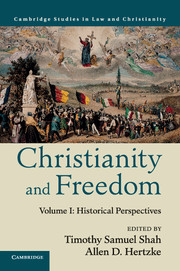Book contents
- Frontmatter
- The Religious Freedom Research Project
- Contents
- Contributing Authors
- Acknowledgments
- Introduction: Christianity and Freedom: Ancient Roots and Historical Innovations
- 1 The Roots of Religious Freedom in Early Christian Thought
- 2 The Christian Roots of Religious Freedom
- 3 Lactantius on Religious Liberty and His Influence on Constantine
- 4 Augustine and Religious Freedom
- 5 Christianity and the Roots of Human Dignity in Late Antiquity
- 6 Liberty of Conscience and Freedom of Religion in the Medieval Canonists and Theologians
- 7 Faith, Liberty, and the Defense of the Poor: Bishop Las Casas in the History of Human Rights
- 8 Calvinist Contributions to Freedom in Early Modern Europe
- 9 Constitutional Protection of the Freedom of Conscience in Colonial America: The Rhode Island and Pennsylvania Experiments
- 10 Christianity and Freedom in the American Founding
- 11 Vibrant Christian Pluralism and the Evolution and Defense of Religious Liberty in America
- 12 Orthodox Christian Contributions to Freedom: Historical Foundations, Contemporary Problematics
- 13 Christianity: A Straggler on the Road to Liberty?
- 14 Protestant Missionaries and the Centrality of Conversion Attempts for the Spread of Education, Printing, Colonial Reform, and Political Democracy
- 15 God and Freedom: Biblical Roots of the Western Idea of Liberty
- Index
8 - Calvinist Contributions to Freedom in Early Modern Europe
Published online by Cambridge University Press: 05 May 2016
- Frontmatter
- The Religious Freedom Research Project
- Contents
- Contributing Authors
- Acknowledgments
- Introduction: Christianity and Freedom: Ancient Roots and Historical Innovations
- 1 The Roots of Religious Freedom in Early Christian Thought
- 2 The Christian Roots of Religious Freedom
- 3 Lactantius on Religious Liberty and His Influence on Constantine
- 4 Augustine and Religious Freedom
- 5 Christianity and the Roots of Human Dignity in Late Antiquity
- 6 Liberty of Conscience and Freedom of Religion in the Medieval Canonists and Theologians
- 7 Faith, Liberty, and the Defense of the Poor: Bishop Las Casas in the History of Human Rights
- 8 Calvinist Contributions to Freedom in Early Modern Europe
- 9 Constitutional Protection of the Freedom of Conscience in Colonial America: The Rhode Island and Pennsylvania Experiments
- 10 Christianity and Freedom in the American Founding
- 11 Vibrant Christian Pluralism and the Evolution and Defense of Religious Liberty in America
- 12 Orthodox Christian Contributions to Freedom: Historical Foundations, Contemporary Problematics
- 13 Christianity: A Straggler on the Road to Liberty?
- 14 Protestant Missionaries and the Centrality of Conversion Attempts for the Spread of Education, Printing, Colonial Reform, and Political Democracy
- 15 God and Freedom: Biblical Roots of the Western Idea of Liberty
- Index
Summary
INTRODUCTION
In an important new book, The Hebrew Republic: Jewish Sources and the Transformation of European Political Thought, the Harvard historian Eric Nelson sharply criticizes the “standard narrative” of early modern political history, which describes it as an era devoted to the separation of religion and politics and to the construction of a secular order built on “pagan classical” learning, Renaissance humanism, and early Enlightenment liberalism. This is largely a “myth,” Nelson argues. The reality is that the early modern era saw “the full fervor of the Reformation unleashed,” with “political theology” made very much part of “the mainstream of European intellectual life.” It was in this overtly religious milieu that the West built many of its cardinal institutions of confederation, human rights, constitutional order, popular sovereignty, democratic politics, and the rule of law. Protestant theological jurisprudence, Catholic political theory and canon law, and Jewish biblical thought, says Nelson, were just as critical to the modern Western political project as the purportedly secular theories of Aristotle, Machiavelli, or Hobbes.
Several other chapters in this volume analyze the critical religious sources and dimensions of law, politics, and freedom before, during, and after the Enlightenment. In this chapter, I focus on the early modern theories and institutions inspired by the teachings of the Genevan Protestant reformer John Calvin (1509–1564). Building in part on classical and Christian prototypes, and drawing on his legal and theological training, Calvin developed arresting new teachings on authority and liberty, duties and rights, and church and state that have had an enduring influence on Protestant lands. Calvin's original teachings were periodically challenged by major crises in the next two centuries – the Marian persecutions of Protestants in England and Scotland, the St. Bartholomew's Day Massacre and wars of religion in France, the Dutch Revolt against Spanish tyranny, the English Revolution and Civil War, the American Revolution, and more. In each such crisis moment, a major Calvinist figure emerged – John Knox, Theodore Beza, Johannes Althusius, John Milton, and others – who reformed Calvin's teachings and converted them into dramatic new legal, political, and constitutional reforms. This rendered early modern Calvinism one of the driving engines of Western constitutionalism. This is the main argument of this chapter, though I leave the American part of the story to David Little's chapter in this volume.
- Type
- Chapter
- Information
- Christianity and Freedom , pp. 210 - 234Publisher: Cambridge University PressPrint publication year: 2016

